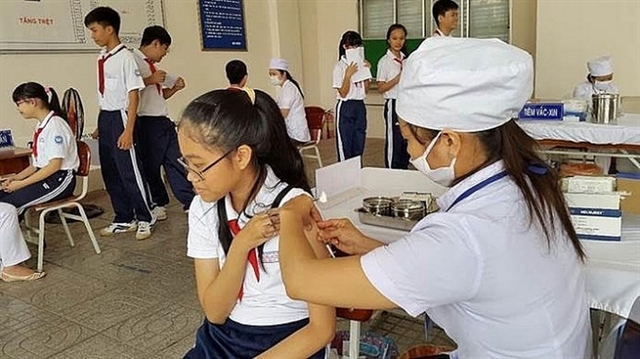 Society
Society


|
| In the next school year any students who has not had their vaccinations will be told they must be immunised to prevent diseases.— Photo plxh.vn |
HÀ NỘI — In the next school year any students who has not had their vaccinations will be told they must be immunised to prevent diseases.
That was the warning from Nguyễn Nhật Cảm, director of Hà Nội Disease Control Centre.
In the first five months of 2019, Hà Nội saw 1,300 cases of measles, 20 times higher than the same period last year. And the number continues to rise.
“In 2018, the percentage of fully vaccinated children under one-year-old in Hà Nội only reached 85 per cent.
“The “5-in-1” vaccine that can help fight against five common, potentially fatal diseases affecting infants - diphtheria, tetanus, whooping cough, hepatitis B and Haemophilus influenza type B has been used less than other types of vaccine, therefore, not only measles but also the other infections are about to rise,” said Cảm.
In some other provinces, the rate of “5-in-1” vaccine injection only reach 30 per cent of the initial plan, making it the most unwanted vaccine in the national expanded immunisation programme.
Meanwhile, diseases breakouts are being reported in many localities. Some 4,000 cases of measles have been found in 62 of 63 provinces including one death in Hải Dương Province.
Hà Nội reported the first patient with Japanese encephalitis in May and the number of infected people may keep rising as the disease’s peak season will continue to August.
“We have proposed some solutions to the city authorities which have been approved. The problem now is how to implement them,” he said.
“In the coming school year, local medical facilities and schools will monitor the vaccination status of students. Those who have not received enough required injections will be administered at school.”
In Việt Nam, the Law on Education does not ban unvaccinated students from school.
“It is crucial to have a mechanism which can ensure children are fully vaccinated,” added Cảm.
According to the General Department of Preventive Medicine, 54 per cent of children infected with measles are unvaccinated while the vaccination status of the other 43 per cent remains unknown. Only 3 per cent of patients were administered vaccines.
Vietnamese children infected with H.p virus four times more than in developed countries
HÀ NỘI 96.2 per cent of Vietnamese children under eight years old who have family members carrying helicobacter pylori (H.p) are infected with the virus, according to a newly released report by the Institute of Gastroenterology and Hepatology.
The research was conducted in two years over more than 360 families and 900 people. The results show that in developing countries including Việt Nam, children are the most vulnerable to H.p especially when their family members are infected with the virus.
This is the exact opposite of the rates in developed countries while children have a very low rate of H.p infection, about 20 per cent.
Helicobacter pylori is one of the main causes leading to gastric and duodenal ulcer problems and affected people are at high risk of stomach cancer.
According to the institute director Nguyễn Duy Thắng, the high rate of H.p infected people and antibiotic resistance in Việt Nam brings challenges to treatment.
At present, the infection rate of H.p in Việt Nam is up to 75 per cent, higher than the US at 45 per cent and the UK at 47 per cent.
The virus can be transmitted via undercooked food, saliva, unsterilised medical instruments and unclean environment. — VNS




